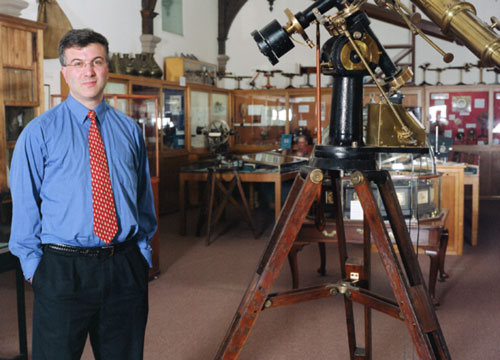Professor Peter Lipton (9 October 1954 – 25 November 2007)
Peter Lipton, the first Hans Rausing Professor of the History and Philosophy of Science, and long-serving head of the Department of History and Philosophy of Science at the University of Cambridge died on 25 November 2007. Lipton collapsed after a squash game; his wife was with him when he died.
Professor Lipton was recognized as one of the leading philosophers of science and epistemologists in the world. Born in New York in 1954, he studied physics and philosophy at Wesleyan University and Oxford where he earned his PhD in 1985 with a thesis on explanation and evidence. From 1985 to 1990 he was Assistant Professor at Williams College, Williamstown, Massachusetts. He joined the Cambridge Department of History and Philosophy of Science in 1991 as Assistant Lecturer, quickly rising to the rank of Lecturer in 1994 and becoming holder of the Departmental Chair in 1997. From June 1996 until his death he also acted as Head of Department.

Peter Lipton in the main gallery of the Whipple Museum. Photograph by Howard Guest.
Lipton was an extraordinarily gifted teacher. His lecture courses on philosophy of science and philosophy of mind attracted big crowds of students and were marked by the most unusual clarity, critical acumen and his wonderful – and justifiably world-renowned – sense of humour. One year the second-year students so wished to show their appreciation for his performance that in the last lecture of the year they showered him with flowers. Many a student was drawn into philosophy through these lectures. Lipton's seminars and reading groups were similarly legendary. His 'Epistemology Reading Group' – modelled on A. J. Ayer's Oxford discussion circle that he had attended – was the philosophical centre of gravity in the Department. Lipton supervised numerous students at all levels; he was always working with between six and ten PhD students.
Lipton lectured widely both within and outside of the academia. He enjoyed bringing philosophical ideas to schools, colleges and summer schools; the frequency with which he was invited back by the same institutions attests to his incredible talent in this domain. He felt very strongly about making Cambridge more accessible to students from different ethnic and socio-economic backgrounds, and made significant contributions towards this goal. It was in keeping with this spirit of openness that Lipton's brilliant inaugural lecture in March 1998 as Professor was simultaneously staged as a contribution to the University's Science Week to a vast audience, many of them schoolchildren. Lipton's many contributions to the internet site 'Ask Philosophers' also fall in this category. He memorably defended his involvement with the site by saying: 'It's very important that philosophers get out more.'
Lipton was a supremely successful administrator. During his time as Head of Department the permanent staff grew from eight to eleven members; the number of students, visitors and research fellows increased sharply; and the Department expanded into two new buildings. Within the University the Department gained a very strong reputation for being run very efficiently. He led from the front, taking on the most menial of tasks with the same respect for detail and inner sense of propriety that he so easily displayed on the most august of occasions. Many other Departments in the University also profited from Lipton's advice as a committee member, and the central administration of the University recognized his gifts and called upon him often, including serving on the General Board. As a Fellow of King's College, Lipton was equally active and prepared to give his time, his generous astuteness and his perpetual wit and humour in the service of the College and its committees.
Professor Lipton's most important contribution to the philosophy of science and epistemology is his book Inference to the Best Explanation (1991, second edition 2004). This work offers a detailed descriptive analysis of the pattern of reasoning in which we infer the hypothesis that, if correct, offers the best explanation of the available evidence. In fleshing out this idea, Lipton put forward highly original ideas on causal and contrastive explanation, proposed analyzing 'best explanation' as 'explanation that most increases our understanding', and defended the idea that a theory deserves more inductive credit when data are predicted than when they are accommodated. Here and in subsequent studies Lipton also used his analysis of Inference to the Best Explanation to put forward striking new defences of scientific realism and intriguing new perspectives on testimonial knowledge. As far as the history of philosophy is concerned, Lipton felt closest to David Hume whom he credited with having 'hooked' him on philosophy. A book on the history of the problem of induction, The Humean Predicament, unfortunately remained unfinished though the main line of his original argument can be gathered from a number of articles on the topic. Lipton wrote widely on many other topics, too, including the philosophy of religion, philosophy of mind, freedom of the will, laws of nature, and bioethics. The latter topic loomed increasingly large during the last years of his life, when he chaired a working party on ethical issues of pharmacogenetics at the Nuffield Council on Bioethics, producing the report Pharmacogenetics: Ethical Issues in 2003.
Professor Lipton was a Fellow of King's College, Cambridge, and a Fellow of the Academy of Medical Sciences.
He is survived by his wife, Diana, and their two sons, Jacob and Jonah.
